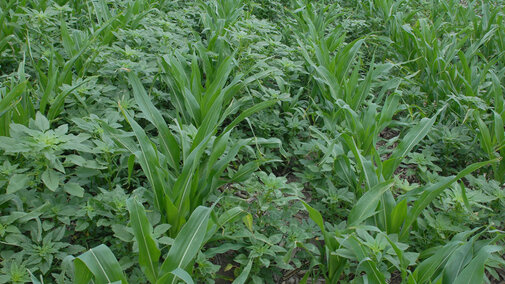Is glyphosate-resistant Palmer amaranth a growing challenge in your crop fields? Are you wondering which weed management programs are apt to work best on your farm?
View field demonstrations and hear from experts at the Glyphosate-Resistant Palmer Amaranth Management Field Day Wednesday, July 11 at Carleton. The event is free and will be held from 8:30 a.m. to 1 p.m.
Keynote speaker will be Aaron Hager, associate professor and Extension weed scientist at the University of Illinois at Urbana-Champaign. He will speak on the biology of Palmer amaranth and current research on its control in corn and soybean, including in new technologies such as Xtend and Enlist soybeans. Hager serves as associate editor for Weed Technology, a journal of the Weed Science Society of America that publishes applied weed science research.
Palmer amaranth, a member of the pigweed (Amaranthaceae) family, is one of the most troublesome weeds in soybean and common to much of the soybean production area of Nebraska. Populations of Palmer amaranth in Nebraska have been found resistant to glyphosate, atrazine, HPPD, and/or ALS herbicides, said Amit Jhala, field day coordinator and Nebraska Extension weed specialist. Jenny Rees will be the local Nebraska Extension educator assisting with the field day.
On-Site Project Demonstrations
- How row spacing and herbicide programs can affect glyphosate-resistant Palmer amaranth control in Roundup Ready 2 Xtend Soybean
- Management of Palmer amaranth in:
- Balance GT/Liberty Link Soybean (resistant to isoxaflutole and glufosinate)
- Enlist E3 Soybean (resistant to 2,4-D choline, glyphosate, and glufosinate.
- Critical period of Palmer amaranth removal affected by residual herbicides in Roundup Ready 2 Xtend Soybean
These in-field demonstrations and research projects were funded by a grant from the Nebraska Soybean Board.
Field Day Details and Registration
The event begins with registration and rolls at 8:30 a.m., followed by a welcome at 9 a.m. and field tours from 9:30 to 11:15 a.m., followed by the keynote presentation. Lunch is included and the program will end at 1 p.m. (View program flyer and feel free to share with friends.)
Register online at agronomy.unl.edu/palmer to assure appropriate meals and tour rides. Three Certified Crop Advisor (CCS) credits will be available for attending. If there are questions about registering, please call 402-472-5656.
For more information about the program or field demonstrations, contact Amit Jhala, Nebraska Extension weed management specialist, at amit.jhala@unl.edu or 402-472-1534.
Directions: From Geneva go south on Hwy 81 for 14.6 miles. Turn west onto Hwy and go 5.3 miles. The field day will be on the south side of Hwy 4 between C Street and Renwick Street in Carleton. (GPS: 40°18’24.7”N 97°40’29.0”W)
Partial funding for this field day was provided by the Nebraska Soybean Checkoff and Nebraska Extension.
More Information
For more information, see these stories on glyphosate-resistant Palmer amaranth in previous issues of CropWatch:
- Glyphosate-Resistant Palmer Amaranth Confirmed in South-Central Nebraska
- Grower Q&A: Is this Herbicide-Resistant Palmer Amaranth?

